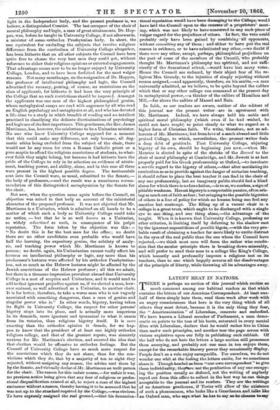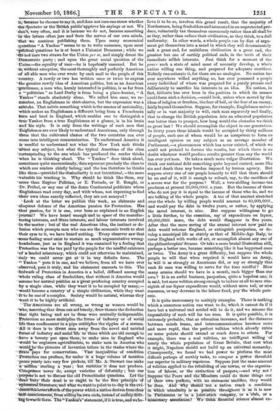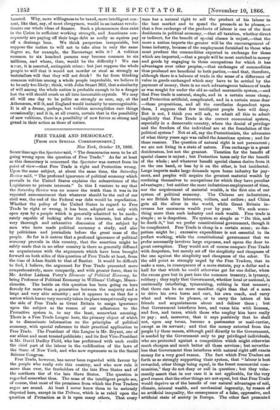LATENT HEAT IN NATIONS.
THERE is perhaps no section of this journal which excites so much comment among our habitual readers as that which contains the letters of our American Correspondent. At least one- half of them simply hate them, read them week after week with an angry consciousness that here is the very thing which of all others they most detest, because it is the only thing they fear, the " Americanization " of Liberalism, concrete and embodied. We have known a Liberal member of' Parliament, a man demo- cratic on points to the toes of his boots, saturated in every mental fibre with Liberalism, declare that he would rather live in China than wader such principles, and another tear the page across with vicious expletives upon our folly in publishing such rubbish. Of the half who do not hate the letters a large section still pronounce them annoying, and probably not one man in ten enjoys them, except for the remarkable literary power they occasionally display. People don't as a rule enjoy sarsaparilla. For ourselves, we do not 'wonder one whit at the feeling the letters excite, for we sometimes share it. Though headed as from "our own correspondent" to give them individuality, they•are not the production of any one occupy- ing the position usually so defined, not the writing of anybody rayed out 'from this office to collect in the best way he can things acceptable to the journal and its readers. They are the writings / 1 of an American gentleman, if Tories will allow of the existence of such a phenomenon, who looks like a Guardsman and talks like an Oxford man, who says what he has to say sake chooses to say it, because he chooses to Say it, and does not-dare one straw Whether the Spectator or the British public' approvellis sayings or not. We don't, 'very 'often, and it it because we do not, because something in the letters often jars and"frets the nerves of Our own minds, that we continue publishing them. Upon many econcimital ;questions " A Yankee" seems tons to Write nonsense, Upon- Most "pelitieal 'cpreations he IS at-heart a Unionist •Democrat ;. While We 'Alb- hot tare twO Straws for the Union per se; And simply detest the 'n'Deinocratic party ; And upon the great' goad- question* of the Union—the equality of 'race—he - is hopelesely unsolind. "- But he Withbut exception; the most thotonghly and-perfeetly American .of all-able men Who eirer wrote by each mail to the people of this A'rowdy or two has written once Or twice to express t4the -genuine rowdy idea of American politics, but as an Arne-Hein
ntleman; a man who, keenly interested in politica, is as far froth
"prolititian "AS Lord Derby is from being a placegmnter; "A Yankee" stands absolutely 'alone. We tailed him once; -We re- nettliber, an-Englishman in shirt-sleeves, but the expression- WAS Miatake. That subtle something which is the essence of natithiality, which makes an Englishman a different being from a Frenchman torn and bred in ' England, which enables one to distinguish a 4.rtieyteakee from a true Englishman ' at' a glance, is in his brain :And his Style. It is only 'froth- the writings of such men that • 'Englishmen are ever likely to understand Americans, only through -them that the Cultivated -classes of the tWo countries can • ever come into intelligent -Corbbrunication. ' To undetatand America it is needful to 'understand- not *hat the New York mob thinks 'Iltrut 'any silbjedt, but what the typical Atneritan of the close ':eorresptinding tci the one which has -produeed the reader thinks when he is thinking' Aloud. 'The " Yankee' - does think aloud, .sertletimes quite unceristiously;Abesrepreaent precisely-the class to which our readers chiefly belortgatid the less therefore he thinks them---prdvidedthediseirailatit,y is not intentional, -•-the more rf-Valtiable his tea-Ching-is. Why 'shiatrld he think like them, any Imibre than Eugene' Pelletan, or E.; Foroade, Botighi, or Frobel, or any one of the dam Continental publicists whom 'Englishmen read every day, and With-whom; not 'expecting to•fmd *heir Orin ideas exactly 'reflected, they•ttrer not annoyed'? '-Look at the letter we publish this Week,' an 'elaborate and -"eloquent defence 'of the American passion for Protection. Has 'that passion; for it is due, - elter 'been so explained in an English • jetunal? We-have heard-enough-And to spare' of the inatufac;- tng bitereiats, and State interests; and labour interests involved fin the matter ; but of' the Teal 'Arnerican idea, the instinct or de- -Ittsion *hick prompts men Who tan see the-economic truth tcialmi -their eyes to it, 'we have heard noticing. 7-EVery observer saw that • -•,-some feeling Moist 'exist to -sustain so much 'argumentative Wrong- "headedness, just as in England it Was sustained by a feeling that Protection was the tax paid by-the people for the needful existence 'sof'alanded'aristoicracy, which could not -otherwise be maintained, *:-Only 'we could never get at it in 'Any definite form. The ' '" Yankee" puts it in One, and-we believe; from all we have ever 'ObserVed, puts it truly; and-his' 'statement amounts to this. -The Amlwark of Prbtection in America is a belief, diffused among the -Whole 'ruling class of -freeholders, that without it America would leonine' her nattral petition as a 'great producing conntry occupied -by a 'single class, while they wantit to be Occupied ty-many,•— -Would become a Country of a 'siniple• cifilization, while-they want 'At-to be one of *complex. Society wbuld be natural, -whereas the* *ant it to be highly artificial.
' • The'Amerioans -Are all wrong, as -*Tong --Ets- women wOnldhe '"Vtho; assertingthat dress cansid beaitty, drewthence the deduction that tight -lacing And: art in 'dress -were mntually-indispeniable. -Protection no more nuiltiplies the forms of industry 'or of secial life than -confinement-in: a:pipe Multiplies the Tipples of a- stream. - All it does is to divert nien 'array 'froth the novel' and tmtried forens of industry and•aecial life to those which are Old enough to have a -bounty- put upon them;• to make ' Men in' England who wonld 'ber engineers agriculturists, to Make • me...ii- in America' WhO woidd -bathe- pioneers Of invention toilers in the trades -where the State -pays • for conservatism. Vast inequalities of -condition .Protection can produce, for under- it a huge voluble 'of taxation pours yearly into very few peckets; till' Mr. A:-Stewart tali-Make - a • million' sterling a year; -but Varieties 'does not produce. Compresses never do; exempt varieties of - deformity; 'but- 'our -.-purpoteis not to disease the old Proteetionistqtestithas. Let the 'dead'bery- their dead is Or OUght--to- be the -first 'princiPle Of - "ephemeral literature; and What Wewant to point to to-day'le the evi- 'detieethisletteraffe-rda Of the power which a nation derives front clan. :telf-conaciousness, front ujilling.its OWn inatead Of nu4el7alift- .1ng towards them. The "Yankees" statement, if it IS true, and webe- lieve it to be so, involves this grand result, that the majority of Northerners, being freeholders and interested in an unprotected pro- duce, voluntarily tax themselves enormously rather than allshall be in they; rather than reduce their civilization, as they think, to a dull Uniforiaity. In other words, a whole people can by dint of atgu- nientget themselves into a mood in Which they will determinately Seek a great end, for multiform civilization is a great end, the greatest but one of earthly political ends, in the teeth of their iininediate -selfish interests. Just think for a moment of the power such a gate of mind must of necessity develop, a Whole 'nation Willing one thing, and prepared for adequate sacrifices. Noblidy Can estimate it, for there are no analogies. . NO nation has ever anywhere 'Willed anything so, has ever possessed a people 'every individual of whom was Prepared for a purely, prosaic end deliberately 'to `Eiar:iifice his interests to an idea. go. "nation, in fact, hitherto has -ever been in the position in which its masses -could forth Such look, unless when moved by the ideas Of religibn or freedom, the fear of hell, or the fear of an enemy, 'fairlYbeyarinlienitelies. Suppose, for example, Englisbinen univer- ItallY or in Vast majority to will, each Man separately and finally, that to Change theDritish population into an educated population was better than to prosper, how long would the obstacles we think so great last ? We should accomplish the object in one generation. In thirty years these igen& would be occupied by thirty millions of people, each one of whom would be as oempetent to form an intelligent opinion on . any subject as an average member of Parliament,—a phenomenon which has never existed, of which we cOn1c1" not pretend td foresee the results, but which there is no doubt- Whatever ivetildProduce reaultegreater than any the world has eieVyeeseen. Or take a niifehmare vulgar illustration. We think our national debt soiriethnigAnite beyond control, more like sin -and death-than any burden imposed by human ageney. But suppose every- One of our people honestly to Will that there should be an end'of it,- will it enough to submit; -say; tothe saeiifices -of a severe war • for the purpose ? Well, a two-shilling income-tax produces at present '30;000,000l a year. But the income of those who do not pay it is equal to the income of those who do,• and we are talking'of the whole people. A tax of that tundttnt stretched over the 'Whole by Willing people Would amonnt to 60,000,0001., and would pay the debt in •tstelve years, or rather, • by applying the Saved interest, in nine. But suppose willingness 'to go a little further; to the cessation, say-of expenditure on liquor, 60,-000,000/. More, the debt would -cblappear in five years. 'After that the Mere saving of the annual interest 'now "paid on debt would 'rehouse -England, • or extinguish paulieriam, or de- velop a Municipal life as stately as that of Middle-Age' 'Italy, cover England With works of art, Or accomplish almost any one Of the philanthropies' dreams. Or-take a more brutal illutitration still, perhaps a better 'one; betatise' something like it has happened once or-twice. The Army is a great difficulty, but suppose 'the whole people to will -that when • required it would have an Artily, to 'willit as strongly as -Americans did-, or say so strongly that each- fit Maxi Was Willing to Serve for the- time needful ? H-ow many armies should we have in a -month; `each bigger than 'caw own ? It is an awful business, pauperism; q:nite a' hckidless one it is said, but mere volition strong enough toinduce nit all toSave one- eighth of our liquor expenditure would;- without More toil;-or new resources, 'or any decrease in the labour fund, paYthe 'Whole podr- rate. .
It is quite unnecessary to multiply examples. There'll' nothing which a numerous nation can Want to do, -Which it cannot 'do if it -have but a tiniversal -and settled' will to do it;And• we iwisume the impessibilityOf • such -will far too Peon. It it-quite poieible, it is 'extremely -probable, that as education increases, And' the distanees between minds -lease; • and intercommunication becomes more and more rapid, that the perfect Volition -Which already exists on i4OnIc points should - *extend Or retteh dciWn to others. For example, there was a• real' Volition, an inteffigent willing "of nearly the 'whole potirdation of Great- Britain; 'that cost What it might, Napoleon' should not build- Up an universal monarchy. Consequently, 'We found we 'had power to Perferm the most difficult perhaps of earthly tasks, to conquer a pnWer threefold 'Our Superior in inilitaryT4onices. 'Suppose just the same amount of Volition applied to the iebnilding of btu towns; 'or the organize- -lion- Of labour; or the -extinction of paupers;and. -why not ? Suppose the Peers and- the !ambers could 'dothose 'things out of their min 'porkets, with lto entirmcinki-eadifice, they would be dime. 'And Iiitcittld 'not' a' nation ' reach 'Is condition -in -Which unantoilty is -as 'phseible• throughont it 'es' it is now in Pitilianiebt 'or-in • a' lointtlet4ck-aoinparty, • 'Or a "'club, or a Missionary assodlittion.?- ' We•think• flxiaticial science 'shoat- ex-
haustecl. Why, mere willingness to be taxed, mere intelligent con- sent, like that, say, of most clergymen, would in an instant revolu- tionize our whole ideas of finance Such a phenomenon does exist in the Union in sufficient working strength, and Americans con- sequently are paying off their huge debt as coolly as squires pay off a drainage loan. We think pauperism insuperable, but suppose the nation to will not to take alms in only the same degree as, for example, the Baronetage wills it ? A volition common to six hundred persons may become common to six millions, and where, then, would be the difficulty ? We can imer, it is asserted, extinguish crime ; but just suppose the whole people to will that it would not murder or steal as strongly as teetotallers will that they will not drink? So fax from thinking common volition among a whole people improbable, we believe it to be only too likely; think, with John Stuart Afill, that a similarity of will among the whole nation is probable enough to be a danger lest the will should crush us all into immutable crystals. We may all will one day to be polite as strongly as men, say, at the Atheneum, will it, and England would instantly be unrecognizable. It is all a dream, perhaps, but volition accomplishes rare things occasionally; and it is, at all events, certain that in the possibility of new volitions, there is a possibility of new forces as strong and grand in their action as those of nature.
































 Previous page
Previous page